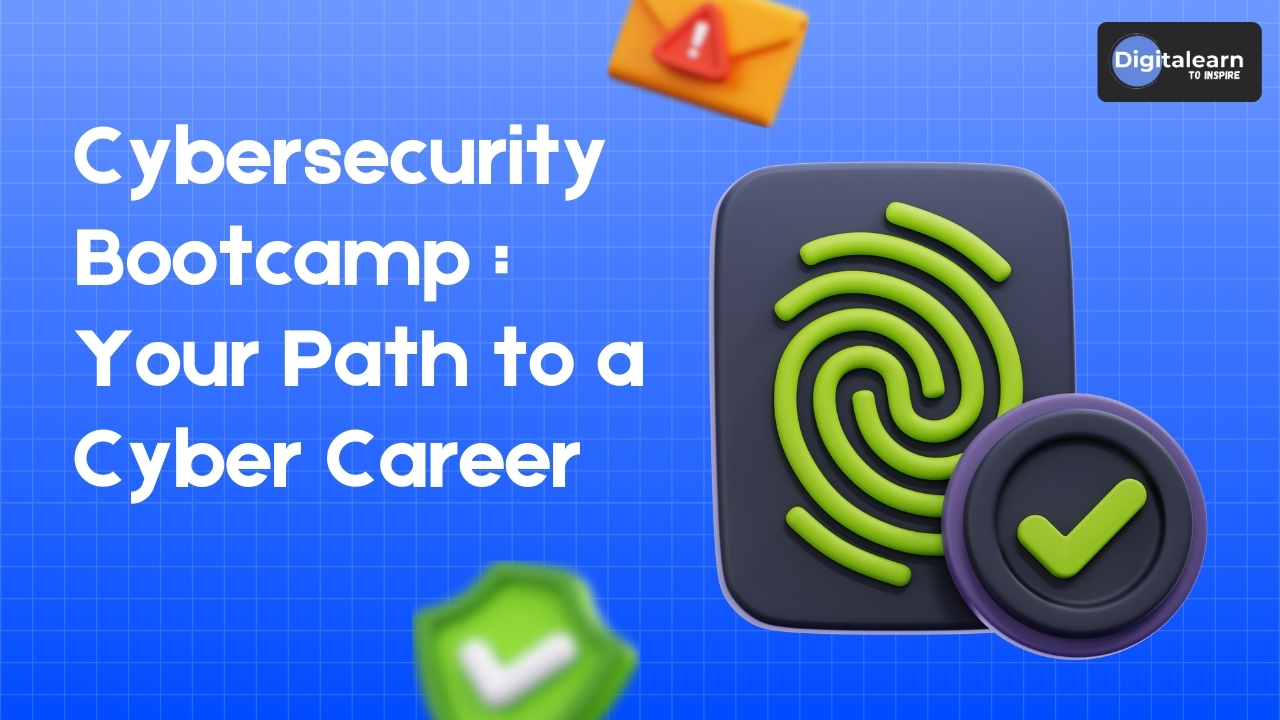
Cybersecurity Bootcamps Your Path to a Cyber Career
Cybersecurity Bootcamps Your Path to a Cyber Career
The demand for skilled cybersecurity professionals is skyrocketing in today world as cyber threats become more sophisticated and frequent. Traditional education paths often take years to complete, leaving a significant skills gap in the industry.
Cybersecurity bootcamps have emerged as a fast, effective solution for training individuals to fill these roles. Offering a focused, hands-on approach, bootcamps equip participants with the practical skills and industry certifications needed to excel in this high-demand field.
Whether you’re a career changer or an aspiring tech professional, cybersecurity bootcamps provide a direct route to success in the ever-evolving cybersecurity landscape.
What is a Cybersecurity Bootcamp?
A cybersecurity bootcamp is a rigorous, short-term training program designed to equip participants with the core competencies needed for a career in cybersecurity. These boot camps emphasize real-world scenarios and practical, hands-on learning to help participants develop industry-relevant skills.
Unlike traditional education programs, which can take years to complete, bootcamps are typically condensed into a few months. They are designed to fit people of all skill levels, from complete novices to those seeking to advance their abilities.
Learn Why Cybersecurity Bootcamps Are Booming
Because governments and businesses are increasingly at risk of cyberattacks, there is a growing need for cybersecurity specialists. Global trends indicate a widening skills gap in cybersecurity, with organizations struggling to find qualified talent.
Cybersecurity bootcamps have emerged as a popular solution, offering accelerated learning pathways that align with industry needs. These programs are flourishing now because they can produce professionals who are ready for the workforce quickly, which makes them a desirable choice for those looking to change careers or become tech specialists.
Are Cybersecurity Bootcamps Worth It? A Comprehensive Analysis
The value of a cybersecurity bootcamp lies in its return on investment. While these programs can be costly, the potential for high-paying job opportunities often offsets the initial expense.
Bootcamps focus on providing practical skills that are immediately applicable in the workplace, which is a significant advantage over more theoretical academic programs.
Insights from hiring managers reveal a growing acceptance of bootcamp graduates, as many possess the hands-on experience and problem-solving skills that employers value.
However, it is essential to research programs carefully to ensure they deliver on their promises and align with career goals.
Here are Top Cybersecurity Bootcamps to Consider
Several cybersecurity bootcamps have earned recognition for their quality and effectiveness. These programs vary in terms of curriculum, cost, duration, and focus areas. Some cater to beginners, while others specialize in advanced topics such as ethical hacking and cloud security.
The thoroughness of the curriculum, the standing of the instructors, and the success stories of the alumni are all important considerations when assessing bootcamps. Testimonials and reviews can offer insightful information about the program’s efficacy.
How to Choose the Best Cybersecurity Bootcamp for Your Goals
Selecting the right cybersecurity bootcamp requires careful consideration of several factors. Prospective participants should evaluate their budget, career objectives, and preferred learning format, whether online or in person.
Researching reviews and connecting with alumni can provide a clearer picture of the program’s strengths and weaknesses. Additionally, understanding the industry certifications offered and the career support provided by the bootcamp can help in making an informed decision.
What to Expect During a Cybersecurity Bootcamp
Cybersecurity bootcamps are designed to be intensive and fast-paced. Participants can expect a structured curriculum that includes theoretical lessons, hands-on projects, and real-world scenarios. Typical topics covered include network security, threat analysis, incident response, and ethical hacking.
Effective time management and program commitment are essential for success. Many bootcamps also offer mentorship and career guidance to help participants transition into the workforce.
Cybersecurity Bootcamp Success Stories: Real People, Real Results
Numerous examples of individuals have successfully transitioned into cybersecurity careers through bootcamps. These stories highlight diverse backgrounds, including career changers, recent graduates, and those reentering the workforce. Bootcamp graduates have gone on to secure roles such as Security Analysts, Ethical Hackers, and Network Administrators, demonstrating the transformative potential of these programs.
The Best Online Cybersecurity Bootcamps Now
Online cybersecurity bootcamps have become increasingly popular due to their flexibility and accessibility. These programs cater to working professionals and those with busy schedules, offering the convenience of remote learning.
Many online bootcamps utilize cutting-edge tools and platforms to deliver interactive and engaging lessons. Features such as live instructor sessions, virtual labs, and peer collaboration ensure a comprehensive learning experience.
For those looking to excel in cybersecurity, our bootcamp, Cyber Security Zero to Hero Bootcamp, stands out as the best option.
This program combines in-depth curriculum with real-world applications, ensuring learners gain practical knowledge and industry-relevant skills. With expert instructors, hands-on labs, and personalized support, participants are well-equipped to tackle cybersecurity challenges.
Our bootcamp also offers flexible learning schedules, making it ideal for busy professionals or those transitioning into the field.
Alternatives to Cybersecurity Bootcamps
While cybersecurity bootcamps offer numerous advantages, they are not the only pathway to a career in cybersecurity. Alternatives include self-paced courses, professional certifications such as CompTIA Security+ or CISSP, and traditional degree programs.
Each option has its own pros and cons, and the choice depends on factors such as time availability, budget, and career aspirations. Comparing these alternatives to bootcamps can help individuals determine the best fit for their needs.
Cybersecurity Bootcamps vs. Traditional Education: Which One Wins?
Cybersecurity bootcamps and traditional education differ significantly in terms of time commitment, cost, and job readiness. Bootcamps are designed for rapid skill acquisition and often include direct pathways to employment.
Traditional degree programs, on the other hand, provide a more comprehensive understanding of the field but require a longer time investment. The decision between the two depends on individual circumstances and career goals.
Bootcamps are ideal for those seeking a quick entry into the field, while traditional education may be better suited for those pursuing advanced research or academic roles.
What Jobs Can You Land After Completing a Cybersecurity Bootcamp?
Completing a cybersecurity bootcamp can open doors to various roles in the industry. Common positions include Security Analyst, Ethical Hacker, Network Administrator, and Incident Response Specialist. These roles often come with competitive salary packages and strong job market demand. Bootcamp graduates are equipped with the practical skills needed to excel in these positions, making them attractive candidates for employers.
Mistakes to Avoid When Choosing a Cybersecurity Bootcamp
Selecting the wrong cybersecurity bootcamp can be a costly mistake. Common pitfalls include falling for scams, choosing programs with limited career support, and overestimating job guarantees. Conducting thorough research, reading reviews, and verifying the credibility of the program are essential steps in avoiding these mistakes. Prospective participants should also be cautious of programs that make unrealistic promises.
Cybersecurity Career Roadmap After Bootcamp
After completing a cybersecurity bootcamp, the next step is to transition into a full-time role. Building a strong portfolio, networking with industry professionals, and preparing for technical interviews are critical for success. Many bootcamps offer career services, including resume reviews and job placement assistance, to help graduates navigate this transition. Continuous learning and obtaining additional certifications can further enhance career prospects.
Frequently Asked Questions (FAQs)
Q. Can a job be secured after a cybersecurity bootcamp?
Yes, many bootcamp graduates find employment in the cybersecurity field, provided they apply themselves and leverage the career support offered by the program.
Q. How long does it take to complete a cybersecurity bootcamp?
Most bootcamps range from 8 to 24 weeks, depending on the program’s intensity and structure.
Q. Do bootcamps provide certifications?
Some bootcamps include industry-recognized certifications as part of their curriculum, while others prepare participants to take certification exams independently.
Q. What are the prerequisites for joining a bootcamp?
Prerequisites vary, but many bootcamps are open to beginners with no prior experience in cybersecurity.
Q. How much do cybersecurity bootcamps cost?
Costs can range from a few thousand to over $20,000, depending on the program and its offerings.
Bonus Section: Tools and Resources for Aspiring Cybersecurity Professionals
For those looking to dive deeper into cybersecurity, several tools and resources can enhance learning and skill development. Popular tools include Wireshark, Metasploit, and Nmap. Free resources such as YouTube channels, blogs, and practice labs provide additional opportunities for hands-on practice. These resources complement bootcamp training and help individuals stay updated with industry trends.





